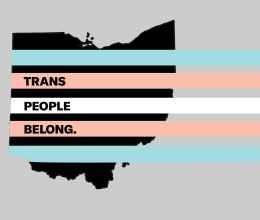For the last several legislative cycles, Ohioans have been inundated with news of our Republican supermajority passing legislation that is in direct opposition to the will of the people. This supermajority, a direct result of gerrymandered maps that favor the Republican Party, has provided cover for politicians to avoid accountability from their constituents - an opportunity they’ve taken full advantage of in recent years. The ACLU of Ohio remains committed to holding elected officials accountable and opposing any law that infringes on the civil liberties and civil rights of Ohioans. That is why the ACLU of Ohio filed an amicus brief on behalf of Equitas Health in City of Columbus v. State of Ohio. The case brought forward by the City of Columbus challenges the legality of Ohio’s Healthcare Denial Law.
In June of 2021, Governor DeWine signed the 2022-2023 biennial budget bill into law. The bill, introduced in February of that year, received significant debate and input from Ohioans over a period of several months. Then, at the last minute, one GOP lawmaker snuck in a provision which allows medical providers, hospitals, and health insurance companies to refuse to provide or pay for a healthcare service if they believe doing so would violate their religious or ethical beliefs. Now known as the Healthcare Denial Law, this amendment has been the source of much controversy and criticism since it was signed into law.
Since this regressive addition to the bill was snuck in just days before the bill was officially passed, behind closed doors we might add, there was no opportunity for public testimony or debate from the people of Ohio. Unfortunately, this lack of transparency has become a hallmark of certain members of the legislature.
While back-room political shenanigans from lawmakers isn’t technically illegal, violating the Ohio Constitution is. The single-subject rule of the Ohio Constitution requires laws to be just that – single subject. The Healthcare Denial Law has nothing to do with the annual budget. This blatant violation of the law highlights yet another example of the foul play and bad governance Ohioans continue to see from the Ohio legislature.
Let’s be clear: Religious freedom does NOT give people the right to discriminate.
By allowing medical providers to refuse care based on religious or moral beliefs, members of the LGBTQ+ community, those living with or affected by HIV/AIDS, and other individuals in marginalized communities are increasingly at risk of losing access to needed healthcare. As a consequence of the Healthcare Denial Law, patients who are already in a vulnerable position seeking medical care could be stripped of their rights because of who they are or who they love. The LGBTQ+ community deserves better from our Statehouse lawmakers.
For nearly four decades, Equitas Health, a nonprofit community healthcare system, has operated in Ohio. Central to its mission is providing healthcare to members of the LGBTQ+ community, as well as those living with or affected by HIV/AIDS, and other individuals in marginalized communities, in an inclusive and nondiscriminatory manner. The Healthcare Denial Law disproportionally puts Equitas Health’s patients at risk because Equitas Health can no longer ensure its staff will uphold the organization’s values of providing inclusive and welcoming healthcare. Consequently, the trust necessary between Equitas Health’s patients and their providers is deeply eroded, stripping Equitas Health of its ability to live its mission to the fullest.
Unfortunately, the Healthcare Denial law is indiscriminate in its discrimination, and it’s disparate, negative impact would go beyond the LGBTQ+ community. The vague language used by those who drafted this law leaves much of the law up to interpretation. For example, this means that a pregnant person could be denied access to an abortion if their healthcare provider is personally against it.
This is just one of many ways that our reproductive freedom is under attack – abortion access in Ohio is already hanging by a thread; lawmakers should be working to expand care, not continuing to limit it.
Overwhelming, Ohioans support nondiscrimination protections for the LGBTQ+ community and abortion access. Thousands of businesses across the state have joined Ohio Business Competes, which calls for Ohio lawmakers to codify LGBTQ+ protections into law. Rather than continue to waste taxpayer dollars on avoidable lawsuits and multiple primaries, Ohio leaders can instead focus on protecting Trans youth, preserving our democracy, and codifying protections for reproductive freedom in our state constitution.
Learn more about our amicus brief, filed on May 31, 2023, here.








